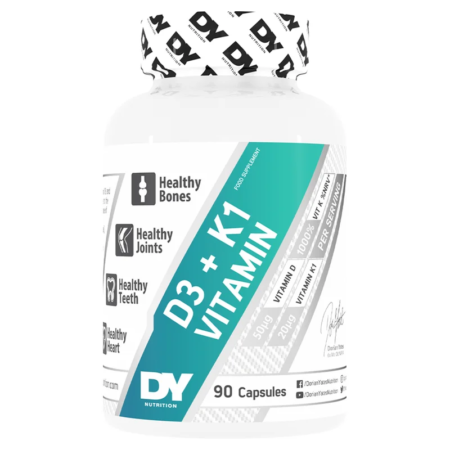Vitamin D
Vitamin D, often celebrated as the sunlight vitamin, plays a critical role in maintaining bone strength and enhancing calcium absorption. This vital nutrient is essential not only for bone health but also significantly influences muscle function, contributing to overall physical wellness and mobility.
Beyond its skeletal benefits, Vitamin D is renowned for its potent anti-inflammatory properties, making it a key player in managing and reducing inflammation-related health conditions. Its efficacy extends to cancer prevention, where it has been shown to potentially lower the risk of certain types of cancer through its role in cell growth regulation and immune function. Additionally, Vitamin D is instrumental in promoting heart health by supporting cardiovascular function and reducing the risk of heart disease. Moreover, it plays a significant role in depression management, with studies suggesting that adequate levels of Vitamin D can improve mood and mitigate the effects of depression.
What is Vitamin D?
Vitamin D is a fat-soluble vitamin that is key to the maintenance of mineral balance in the body. It assists in the absorption of calcium and phosphorus, which are essential for developing the structure and strength of your bones. Without adequate levels of Vitamin D, bones can become thin, brittle, or misshapen.
Beyond its primary functions, Vitamin D influences numerous other bodily processes, including modulation of cell growth, neuromuscular and immune function, and reduction of inflammation. This crucial vitamin helps maintain a healthy immune system and supports brain function. Furthermore, it plays a role in regulating insulin levels and may support diabetes management.
Benefits of Vitamin D
The benefits of Vitamin D are vast and vital for overall health and wellness:
- Enhances bone and muscle strength, ensuring your skeletal structure remains robust and functional.
- Improves calcium absorption, effectively preventing osteoporosis and other bone-related disorders.
- Supports the immune system, significantly reducing the risk of infections and illnesses.
- Has anti-inflammatory properties, which are particularly useful in pain management and chronic conditions.
- Plays a role in cancer prevention strategies, contributing to overall long-term health.
- Important for cardiovascular health, reducing the risk of heart disease and promoting a healthy circulatory system.
- Assists in managing symptoms of depression, providing mental health benefits and improving overall mood.
Risks of Vitamin D Deficiency
A lack of Vitamin D can lead to several health problems, emphasizing the importance of maintaining adequate levels:
- Increased risk of bone fractures and osteoporosis, as the bones become fragile and more prone to breaking.
- Muscle weakness, particularly in the elderly, which can lead to an increased risk of falls and injuries.
- Potential increase in cardiovascular diseases, contributing to heart health complications.
- Greater susceptibility to infections due to a weakened immune system, making it harder for the body to fight off illnesses.
- Possible links to depression and mood swings, affecting mental health and overall well-being.
Where can I get Vitamin D from?
Obtaining sufficient Vitamin D can be achieved through various sources. What are the best methods? Sunlight exposure is the most natural way to get it, as your skin synthesizes it when exposed to UV rays. However, there are additional sources to consider. Fatty fish such as salmon, mackerel, and sardines are rich in this nutrient. Egg yolks provide a moderate amount. Fortified foods like milk, cereal, and orange juice are often enriched with it. Additionally, supplements are an effective way to ensure adequate intake, especially for those with limited sun exposure.
Vitamin D for Bones
Vitamin D’s role in maintaining bone health cannot be overstated. It is essential for allowing the body to retain calcium and maintain the proper calcium levels in your blood, which is crucial for bone density and health. Without adequate levels, the body cannot effectively absorb calcium, leading to weaker bones and a higher risk of fractures and osteoporosis.
In addition to aiding calcium absorption, it is pivotal in the process of bone remodeling and growth. It helps regulate calcium and phosphate balance in the blood, which is necessary for normal bone formation and mineralization. By ensuring that your body can efficiently use the calcium you consume, this nutrient significantly reduces the risk of bone diseases such as rickets in children and osteomalacia in adults, both of which result from deficiency.
Maintaining adequate levels of this nutrient is a proactive approach to safeguarding your bone health, contributing to a robust skeletal system throughout your life. Incorporating sufficient amounts into your diet or through supplements is essential for overa
Vitamin D – The Immune System
This nutrient is a powerful modulator of the immune system. It helps regulate the immune response and has been shown to decrease the risk of autoimmune diseases. How does this impact overall health? A well-regulated immune system reduces the frequency and severity of infections and chronic inflammatory diseases. By supporting immune function, it helps protect against a range of illnesses, contributing to overall wellness and resilience.
By maintaining optimal levels, you support a well-functioning immune system capable of protecting against a variety of illnesses. This not only contributes to overall health but also ensures a better quality of life by minimizing the impact of infectious and chronic diseases.
What is a Healthy Level of Vitamin D?
Healthy levels are typically between 20-50 ng/mL, according to medical standards. Ensuring these levels can be crucial for optimal health, particularly in areas with limited sunlight exposure. Maintaining a healthy level helps support bone health, immune function, and overall well-being, making it important to monitor and adjust your intake if necessary.





















